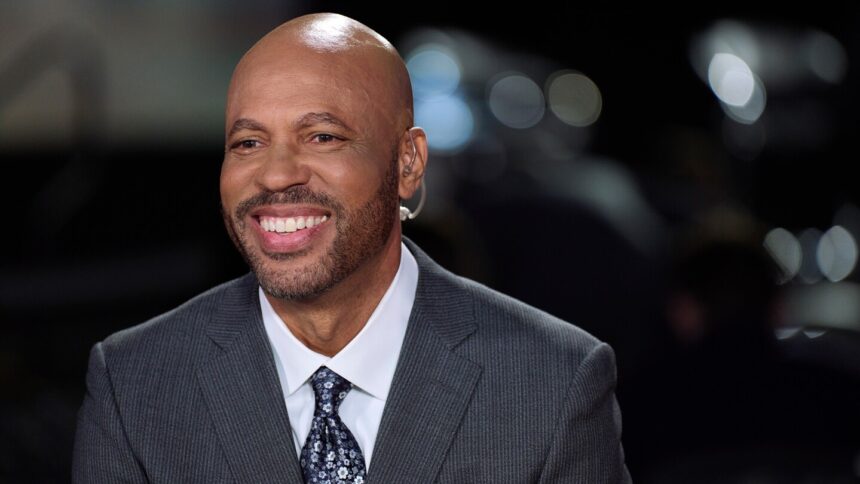As the saying goes, “Common sense ain’t.” That often applies in the legal system, where gobbledygook and mumbo-jumbo can get in the way of basic logic and reality.
In Jim Trotter’s retaliation case against the NFL, common sense has prevailed. At least for now.
Following the filing of his lawsuit, a wide range of people — from armchair Matlocks all the way to seasoned lawyers who know better — have made arguments that defy the basic A-leads-to-B-leads-to-C reality of the events that prompted the NFL to part ways with Trotter.
It was simple. He complained about the lack of representation in the NFL Media newsroom. Nothing changed. He complained some more. Nothing changed. He took it up with NFL Commissioner Roger Goodell, in a public setting. Nothing changed. He continued to complain. Nothing changed. He eventually took it up again with Goodell, in a public setting.
Then, something changed.
After Trotter publicly pressed Goodell for answers during a second straight Super Bowl press conference — and after Goodell served up yet another non-responsive word salad — the NFL lost all interest in extending Trotter’s contract, which was due to expire in just a matter of weeks.
Some have argued that Trotter wasn’t fired; his contract wasn’t renewed. That doesn’t matter if the employee wants the relationship to continue. When an employment contract expires in this context, the employee: (1) gets a new contract; (2) becomes an at-will employee; (3) resigns; or (4) is fired. By not renewing Trotter’s contract and not inviting him to remain as an at-will employee, the NFL fired Trotter.
In a 38-page ruling explaining the decision to allow Trotter’s retaliation claim to proceed (and resolving other claims in the case, some of which were dismissed), Judge Jed S. Radkoff applied common sense to the situation. For cases like this, it’s critical to do that. Rarely if ever will there be a smoking gun. Rarely if ever will there be tangible proof that Col. Nathan Jessup ordered the Code Red. Rarely if ever will the case entail anything other than an effort to use circumstantial evidence and common sense to blow holes in the loud, predictable denials offered by the employer.
The key to Trotter’s claim was to allege facts that prove a “causal connection” (in English, that bridge the gap) between what he did and what the NFL decided to do. He asked Goodell a tough question in public about a matter of racial equity and inclusion. The second time Trotter did it, Goodell became sufficiently “perturbed” (as Trotter alleges) that the media company he runs decided to dramatically alter its position on whether to keep Trotter.
It can be difficult to get a judge to focus on basic common sense, especially when (as lawyers representing employers often do) the lawyers representing the NFL essentially tried to kick dirt in the eyes of the umpire. For example, the NFL’s lawyers argued that Trotter’s questions to Goodell didn’t count as “protected activity” under the law because he asked the questions in his capacity as a reporter. Which, if taken to its logical extreme, would authorize the NFL to fire any NFL Media reporter for asking any question that Goodell doesn’t like at any time regarding any workplace issue, because the activity could never protect the reporter against retaliation by the person who both was asked the question and literally signs the reporter’s paycheck.
The judge rejected the various efforts made by the NFL to obscure the basic, commonsense reality that Trotter became a troublemaker (in the eyes of the NFL), and that the best way to handle him was to let his contract expire and not renew it. The judge also recognized that the about-face on renewing Trotter’s contract after he pressed Goodell for a second straight time in a public setting was the “final straw.”
“These were complaints publicly criticizing the Commissioner of the NFL to his face, accusing him of failing to live up to his promise to address race discrimination (or at least a lack of diversity) in the NFL,” the judge writes at page 29 of the ruling. “It is easy to imagine how this remark could have tipped the scales and led to Trotter’s ultimate termination.”
The case is still in the early phases. The NFL will continue to aggressively defend itself, as it always does. Trotter will have the ability to take discovery, getting documents and memos and emails and texts and questioning Goodell and other witnesses under oath during depositions in an effort to prove this simple chain of logic.
One, the NFL wanted to renew Trotter’s contract.
Two, he aggressively challenged Goodell publicly about the failure to take action to remedy Trotter’s complaints from one year earlier.
Three, the NFL changed its mind about Trotter.
This will surely take many months if not several years to fully resolve. For now, however, the willingness and ability of the judge to apply common sense has kept the case alive.











